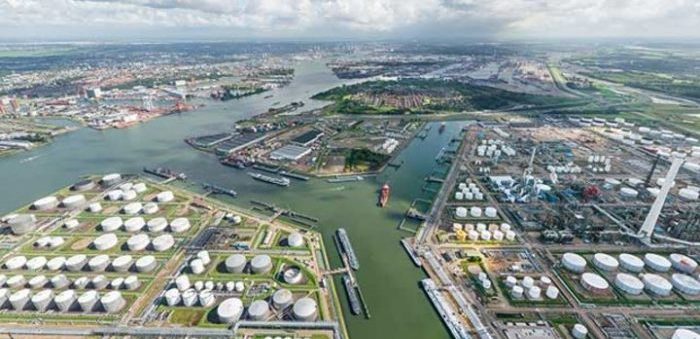Ahead of the 2020 sulphur regulations and committed to tackle climate change by gradually adopting zero emissions measures, the Port of Rotterdam is trying to improve its environmental footprint. From green incentives, to using alternative power, Europe’s busiest port is on course to reduce its emissions.
Currently Rotterdam produces 20% of Netherlands’ climate-changing gases, Reuters reported. However, the Port is trying to reverse that and meet the Paris Agreement goals.
[smlsubform prepend=”GET THE SAFETY4SEA IN YOUR INBOX!” showname=false emailtxt=”” emailholder=”Enter your email address” showsubmit=true submittxt=”Submit” jsthanks=false thankyou=”Thank you for subscribing to our mailing list”]
By adopting a variety of measures, including financial incentives for green operation and alternative power, the Port of Rotterdam wants to reduce its carbon dioxide emissions from shipping and industry by 49% by 2030 and 90% by 2050.
In order to encourage greener shipping, the port launched financial incentives for low- or zero-carbon ships. Namely, since July 2017, all ships that call at Rotterdam receive a score out of 100, based on how much NOx and SOx they produce. Using an index, the port can provide discounts to the cleanest ships.
Another digital project, Pronto, plays a big role in reducing shipping emission as it helps in making ships and port processes more efficient. With Pronto shipping companies and service providers exchange information about their port visits. This information is able to reduce emissions by up to 20%.
In addition, alternative energy also plays a key role in Port of Rotterdam’s sustainability plan. Currently, fully electric sea ships are not operating in the Netherlands. Nonetheless, vessels that operate on rivers and in inland water are considering this option.
To help the industry in adopting alternative power, the Port partnered with Skoon Energy B.V., a Dutch startup that assists ships switch to electric propulsion. The company does that by creating rechargeable battery packs, that can be used on diesel-electric vessels.
These measures are positive, but the cost of reducing emissions will be high, the Thomson Reuters Foundation noted, as investment from both governments and private are needed.
The silver lining is the fact that the Dutch government has granted 1.25 million euros for innovative shipping projects, while in 2019 it will present a new ‘Green Deal’ to drive sustainable shipping.






























































